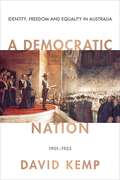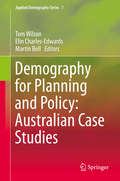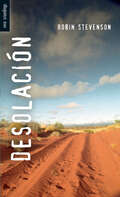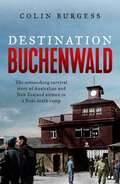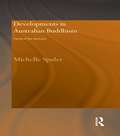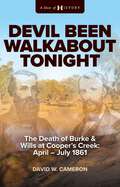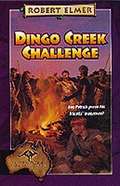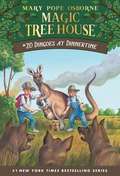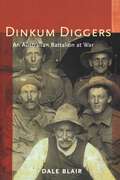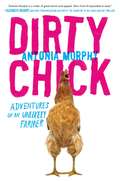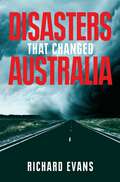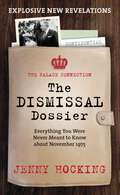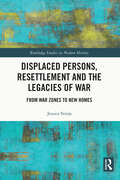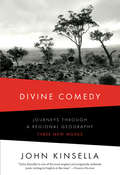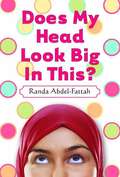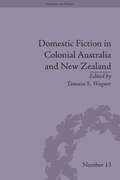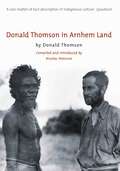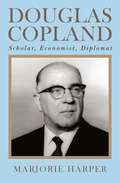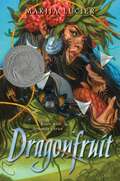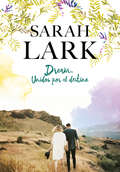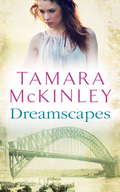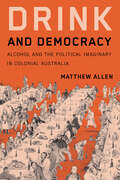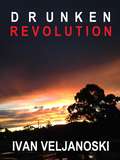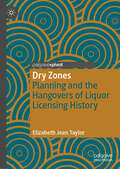- Table View
- List View
Democratic Nation: Identity, Freedom and Equality in Australia 1901–1925
by David KempA Democratic Nation: Identity, Freedom and Equality in Australia 1901-1925 tells the story of the political battle after Federation to achieve unprecedented levels of social and economic equality, while preserving both national independence and individual freedom. As the third book in a landmark five-volume Australian Liberalism series, A Democratic Nation shows how Australians, inspired by the exceptional democracy they had achieved, set out to perfect its principles while protecting it from a world they saw as increasingly threatening. The period saw political battles within and between Liberal and Labor parties as attempts to protect identities defined by nation, class and race confronted ideas of individual freedom and equality. As the war of 1914-18 between the European empires gave rise to unimaginable horrors, economic chaos and continuing violence, the Australian Labor Party shattered and the Liberal Party became submerged in a new Nationalist win-the-war alliance. In peacetime it struggled to restore the nation's social and economic health under the weight of pre-war and wartime identity-based policies. Throughout years of divisive political conflict, the Australian people would remain largely faithful to their hope of a land that would give them freedom to chart their own destinies, and would resist the siren calls of those who promised a conflict-free world by the use of centralised power to reconstruct the industrial and social order.
Demography for Planning and Policy: Australian Case Studies
by Tom Wilson Elin Charles-Edwards Martin BellThis edited collection shows how demographic analysis plays a pivotal role in planning, policy and funding decisions in Australia. Drawing on the latest demographic data and methods, these case studies in applied demography demonstrate that population dynamics underpin the full spectrum of contemporary social, economic and political issues. The contributors harness a range of demographic statistics and develop innovative techniques demonstrating how population dynamics influence issues such as electoral representation, the distribution of government funding, metropolitan and local planning, the provision of aged housing, rural depopulation, coastal growth, ethnic diversity and the well-being of Australia's Indigenous community. Moving beyond simple statistics, the case studies show that demographic methods and models offer crucial insights into contemporary problems and provide essential perspectives to aid efficiency, equity in public policy and private sector planning. Together the volume represents essential reading for students across the social sciences as for policy makers in government and private industry.
Desolación: (Outback) (Spanish Soundings)
by Robin StevensonDesde que lo dejó su novia, Jayden ha estado evitando la escuela...y la vida en general. Cuando su excéntrico tío Mel lo invita a Australia porque necesita ayuda en su investigación de biología, Jayden piensa que no tiene nada que perder. Lo malo es que eso implica viajar al abrasador desierto en el interior despoblado de Australia con el cada vez más paranoico Mel y una hostil estudiante de biología llamada Natalie. Entonces los golpea el desastre y, a muchas millas de la civilización, Jayden y Nat tienen que luchar por sus vidas. Since his girlfriend dumped him, Jayden has been avoiding school—and life in general. When his eccentric uncle Mel invites him to help with his biology research at an Australian university, he figures he has nothing to lose. Once he arrives, he discovers Mel is obsessed with finding a new species of lizard and is determined to be the first to discover it. Unfortunately, this means an expedition into the scorching desert heat of the Australian outback...with the increasingly paranoid Mel and an unfriendly biology student named Natalie. Then disaster strikes, and Jayden and Nat find themselves many miles from civilization fighting for their survival.
Destination Buchenwald: The astonishing survival story of Australian and New Zealand airmen in a Nazi death camp
by Colin BurgessThe harrowing story of the Allied airmen who experienced the true horrors of Nazism firsthand. It was the summer of 1944 as liberating Allied forces surged towards Paris following the D-Day landings. For a large group of downed airmen being held in that city&’s infamous Fresnes Prison, they were about to face evacuation into the blackest, bloody heart of Germany and experience the most acute evil of the war. Amid great secrecy, those 168 airmen – including several from Australia and New Zealand – were transported on a filthy, overcrowded nightmare train journey which ended at the notorious Buchenwald concentration camp, accompanied by orders for their execution. At Buchenwald they witnessed extreme depravity that would haunt them to the end of their days. Yet, on returning home, they were confronted by decades of denials from their own governments that they had ever been held in one of Hitler&’s most vile concentration camps. In conducting his original deep research for this book – now completely expanded and updated – Colin Burgess personally interviewed or corresponded with dozens of the surviving airmen from a number of nations, including their valorous leader, New Zealand Squadron Leader Phil Lamason. Destination Buchenwald tells a compelling story of extraordinary bravery, comradeship and endurance, when a group of otherwise ordinary servicemen were thrust into an unimaginable Nazi hell. 'This was the first book to provide an insight into our experiences as a group of captured allied airmen, betrayed to the Gestapo, tortured and deported to Buchenwald concentration camp. I consider it to be one of the best interpretations of the events as it reflects the voices of the survivors and their challenges to stay alive in such dehumanising circumstances.' Sqn Ldr Stanley Booker, RAF (Rtd.), MBE, Légion D'Honneur: Last surviving member of the Buchenwald airmen
Developments in Australian Buddhism: Facets of the Diamond (Routledge Critical Studies in Buddhism #Vol. 22)
by Michelle SpulerThis book examines the adaptation of Buddhism to the Australian sociocultural context. To gain insight into this process of cross-cultural adaptation, issues arising in the development of Diamond Sangha Zen Buddhist groups (one of the largest Zen lineages in the West) in Australia are contextualised within the broader framework of the adaptations of Buddhist teachings and practices in other Westernised countries. The book also examines the methodological approaches currently used for studying this process and suggests a synthesis of the approaches used for studying convert and ethnic Buddhist groups.
Devil Been Walkabout Tonight: The Death Of Burke & Wills At Cooper's Creek: April - July 1861 (A Shot of History)
by David W. CameronThis book focuses on the last three months of Robert O&’Hara Burke, William John Wills, and John King on Cooper&’s Creek. The original expedition which set out in August 1860 was to explore the centre and northern reaches of the Australian continent. The expedition essentially concluded with the death of Burke and Wills on Coopers Creek from starvation and illness in late June and early July 1861. The tragedy was a sliding doors moment in history. Burke, Wills, and King arrived back at the famous &‘Dig Tree&’ camp site, the same day that this manned outpost decided to pack up and return south towards Menindie. They missed each other by a matter of hours. Over the last few decades revisionist history has attempted to place Burke, Wills, and the sole survivor King, within the paradigm of &‘stupid, arrogant white fellas&’ who ignored the wisdom and help of the Yandruwandha people who had successfully carved out a niche along and around Cooper&’s Creek. The story as told by the participants through their diaries, letters, journals, and oral history from members of the Yandruwandha clan tells a completely different story. The three men appreciated that their very survival was dependent on the Yandruwandha and much time was spent trying to keep good relations with the local indigenous clan, with a few odd exceptions. Overall, relations between the two groups were good, and it was for this reason that King survived with the help of the Yandruwandha people – without them he too would have died. This book places the death of Burke and Wills, and the generosity and good will of the Yandruwandha clan in its proper historical context.
Dingo Creek Challenge (Adventures Down Under #4)
by Robert ElmerBook 4 in the Adventures Down Under series for middle-grade readers. Patrick and Becky find themselves in the middle of a dangerous confrontation between the town troublemakers and the local aborigines. Can they win the battle?
Dingoes at Dinnertime (Magic Tree House #20)
by Mary Pope OsborneWildfire! That's what Jack and Annie are up against when they are whisked away to the land of Australia. And they're not alone! Jack and Annie must help a baby kangaroo and a koala escape from a fire-filled forest. Will they be able to rescue the animals in time? To find out, you'll have to read...
Dinkum Diggers: An Australian Battalion at War
by Dale James BlairTall, sun-bronzed, hardy. Resourceful, independent, egalitarian. Scornful of authority, loyal to their mates. These mythical characteristics of the Anzac 'diggers' are central to our idea of what it is to be Australian. But did the soldiers themselves fit the stereotype? How closely does the myth match the reality? This penetrating study strips away celebratory generalisations and measures the Anzac legend against the actual experiences of one battalion that fought at Gallipoli and on the Western Front in World War I. The diaries and letters written by soldiers of the 1st Battalion reveal attitudes, insights, comments and criticisms that qualify and even contradict the Anzac legend. In Dinkum Diggers, Dale James Blair compares these first-hand accounts by front-line infantrymen with unit diaries, operational records, service and repatriation records, as well as with interviews with family members and statistical analysis, to present a well-rounded picture of the complexities of the 1st Battalion's experience. By narrowing the focus of Australian war experience to a single battalion, he demonstrates nuances and subtleties, showing how the men viewed and reacted to their own officers and how both officers and men behaved in combat. He follows these war-damaged soldiers into civilian life, where they mostly kept quiet as conservative forces worked to enshrine and sanitise Australia's sacrifice. This book makes a notable contribution to revisionist studies about World War I. It is a patient, thorough and scholarly demolition job on the Anzac legend, a reality check on back-slapping triumphalism and the glorification of war.
Dirty Chick
by Antonia Murphy"One month into our stay, we'd managed to dispatch most of our charges. We executed the chickens. One of the cats disappeared, clearly disgusted with our urban ways. And Lucky [the cow] was escaping almost daily. It seemed we didn't have much of a talent for farming. And we still had eleven months to go."Antonia Murphy, you might say, is an unlikely farmer. Born and bred in San Francisco, she spent much of her life as a liberal urban cliché, and her interactions with the animal kingdom rarely extended past dinner.But then she became a mother. And when her eldest son was born with a rare, mysterious genetic condition, she and her husband, Peter, decided it was time to slow down and find a supportive community. So the Murphys moved to Purua, New Zealand--a rural area where most residents maintained private farms, complete with chickens, goats, and (this being New Zealand) sheep. The result was a comic disaster, and when one day their son had a medical crisis, it was also a little bit terrifying.Dirty Chick chronicles Antonia's first year of life as an artisan farmer. Having bought into the myth that farming is a peaceful, fulfilling endeavor that allows one to commune with nature and live the way humans were meant to live, Antonia soon realized that the reality is far dirtier and way more disgusting than she ever imagined. Among the things she learned the hard way: Cows are prone to a number of serious bowel ailments, goat mating involves an astounding amount of urine, and roosters are complete and unredeemable assholes.But for all its traumas, Antonia quickly embraced farm life, getting drunk on homemade wine (it doesn't cause hangovers!), making cheese (except for the cat hair, it's a tremendously satisfying hobby), and raising a baby lamb (which was addictively cute until it grew into a sheep). Along the way, she met locals as colorful as the New Zealand countryside, including a seasoned farmer who took a dim view of Antonia's novice attempts, a Maori man so handy he could survive a zombie apocalypse, and a woman proficient in sculpting alpaca heads made from their own wool.'Part family drama, part cultural study, and part cautionary tale, Dirty Chick will leave you laughing, cringing, and rooting for an unconventional heroine.
Disasters That Changed Australia
by Richard EvansAustralian history is full of disasters. Some are natural but many more are man-made, results of individual or collective stupidity, reckless decisions, or greed. In Disasters that Changed Australia, Richard Evans nominates the worst disasters in an engrossing, insightful account of what happened and why. Picture British General, Douglas Haig through sheer arrogance and determination sending thousands of Australian men into swampy, disease-ridden enemy territory for no strategic gain. Or a feral legion of rabbits let loose on the environment, turning furry friends into an uncontrollable plague. Including Cyclone Tracy, Black Friday, the Snowy Mountains Scheme and the destruction of megafauna thousands of years ago, these are just many of debacles that have defined Australia. Richard Evans goes beneath the familiar stories and myths, and urges us to rethink how we respond to disasters to avoid making the same mistakes again.
Dismissal Dossier: The Palace Connection: Everything You Were Never Meant to Know about November 1975
by Jenny HockingHere is the definitive story of the most divisive episode in Australia's history—the dismissal of Gough Whitlam's Labor government. In her award-winning biography of Gough Whitlam, Jenny Hocking revealed the astonishing secret story of the planning and the people behind the dismissal. Never before released material from Sir John Kerr's private papers revealed the secret role of High Court justice Sir Anthony Mason and Kerr's collusion with Malcolm Fraser. Now, Hocking's forensic investigations reveal explosive files in the UK National Archives that add a disturbing dimension to this untold story. Hocking reveals the Palace connection and unravels the web of intrigue behind the British Office's link to the dismissal of the Whitlam government in the name of the Queen. She brilliantly brings together this hidden history—a mixture of the unknown, the overlooked and the clandestine—to write a political thriller: the story you were never meant to know.
Displaced Persons, Resettlement and the Legacies of War: From War Zones to New Homes (Routledge Studies in Modern History)
by Jessica StrojaThis book provides a case study on the ongoing impact of displacement and encampment of refugees who do not have access to resettlement support services, or are resettled in locations of low cultural and linguistic diversity. Following the journeys of displaced families and children who left Europe after the Second World War to seek resettlement in Queensland, Australia, this book brings together the rarely heard voices of these refugees from written archives, along with material from more than 50 oral history interviews. It thoroughly explores the impacts of displacement, encampment and eventually resettlement in locations without resettlement facilities or support networks. In so doing, the book brings to light important findings that can be used to help understand the experiences of those impacted by contemporary refugee crises, and can be considered when developing responses and assistance in locations where there is a lack of diversity or support for refugees. This book will be of interest to scholars and students studying and researching the history of migration, sociology of migration, psychological effects of migration and displacement, as well as demography. Practitioners and policy makers will also be able to draw from this book when considering the long-term impacts of responses to contemporary refugee crises.
Divine Comedy: Three New Works
by John Kinsella"One of the most original and poignantly authentic poets writing in English."--Harold Bloom A three-part, epic work challenging our notions about the environment by Australia's preeminent poet of the natural world. Consisting of Purgatorio: Up Close, Paradiso: Rupture, and Inferno: Leisure Centre, John Kinsella's "distractions" on Dante's Divine Comedy journey through time and space. Set in a wheat-belt Western Australia, these poems are a phantasmagoria of the real and imagined, depicting nature in its full regalia, resisting forces of environmental damage and human indifference.
Does My Head Look Big In This?
by Randa Abdel-FattahWhen sixteen-year-old Amal decides to wear the hijab full-time, her entire world changes, all because of a piece of cloth ... Sixteen-year-old Amal makes the decision to start wearing the hijab full- time and everyone has a reaction. Her parents, her teachers, her friends, people on the street. But she stands by her decision to embrace her faith and all that it is, even if it does make her a little different from everyone else. Can she handle the taunts of "towel head," the prejudice of her classmates, and still attract the cutest boy in school? Brilliantly funny and poignant, Randa Abdel-Fattah's debut novel will strike a chord in all teenage readers, no matter what their beliefs.
Domestic Fiction in Colonial Australia and New Zealand (Gender and Genre #13)
by Tamara S WagnerColonial domestic literature has been largely overlooked and is due for a reassessment. This essay collection explores attitudes to colonialism, imperialism and race, as well as important developments in girlhood and the concept of the New Woman.
Donald Thomson In Arnhem Land
by Nicolas Peterson'I had lived and hunted with these people, accompanied them on their nomadic wanderings and learned their customs and their languages with the result that I understood and believed in them and resented the injustices under which they had suffered for so long at the hands of the white man and other invaders of their territory.' In 1932-33, Yolngu people living in the Caledon Bay area of north-east Arnhem Land were involved in the killing of five Japanese fishermen and three Europeans. A punitive expedition was proposed to 'teach the Aborigines a lesson'. In response, Donald Thomson, a Melbourne-born anthropologist, offered to investigate the causes of the conflict. After seven months of investigation he persuaded the Federal Government to free the three men convicted of the killings and returned with them to their own country, subsequently spending fifteen months documenting the culture of the region. Whilst in Arnhem Land, Thomson, a superb and enthusiastic photographer, made the most comprehensive photographic record of any fully functioning, self-supporting Aboriginal society that we will ever have. The one hundred and thirty images included in this book cover domestic life, subsistence, house types, material culture, and religious life, providing a uniquely privileged glimpse of life beyond the frontier. Thomson recorded his experiences in newspaper and academic articles, private papers and extended reports to the government. Nicolas Peterson brings this material together as a compelling, highly personal narrative in Thomson's own words. It is a narrative that names all the Aboriginal people involved, presenting them as individuals in a way no other writings of the time do. Through it all Thomson's passionate commitment to Aboriginal rights as defender, critic and advocate, shines through.
Douglas Copland
by Marjorie Harper'In Australia the name Copland is one to be conjured with.' The Canadian ambassador to China was addressing the diplomatic corps gathered to farewell Professor Douglas Copland, Australia's second Minister to China. It was early 1948, and Copland was leaving China to become founding Vice-Chancellor of the new Australian National University in Canberra. The compliment was a reference to Copland's outstanding career in Australia as an academic, applied economist, administrator and public intellectual. His academic writings were numerous and timely, his newspaper articles were widely syndicated and he was constantly in demand as a public speaker and broadcaster. Copland's name is perpetuated by a lecture theatre at the University of Melbourne, a building at ANU, a secondary college in the Canberra suburb of Melba and by a series of lectures sponsored by the Committee for Economic Development of Australia.
Dragonfruit
by Makiia LucierAn Asian/Pacific American Award Honor BookA USA TODAY bestsellerOne of NPR's 2024 "Books We Love"A Kirkus Best Book of 2024A School Library Journal Best Book of 2024A New York Public Library Best Book of 2024From acclaimed author Makiia Lucier, a dazzling, romantic fantasy inspired by Pacific Island mythology. In the old tales, it is written that the egg of a seadragon, dragonfruit, holds within it the power to undo a person’s greatest sorrow. But as with all things that offer hope when hope had gone, the tale came with a warning.Every wish demands a price.Hanalei of Tamarind is the cherished daughter of an old island family. But when her father steals a seadragon egg meant for an ailing princess, she is forced into a life of exile. In the years that follow, Hanalei finds solace in studying the majestic seadragons that roam the Nominomi Sea. Until, one day, an encounter with a female dragon offers her what she desires most. A chance to return home, and to right a terrible wrong.Samahtitamahenele, Sam, is the last remaining prince of Tamarind. But he can never inherit the throne, for Tamarind is a matriarchal society. With his mother ill and his grandmother nearing the end of her reign. Sam is left with two choices: to marry, or to find a cure for the sickness that has plagued his mother for ten long years. When a childhood companion returns from exile, she brings with her something he has not felt in a very long time—hope.But Hanalei and Sam are not the only ones searching for the dragonfruit. And as they battle enemies both near and far, there is another danger they cannot escape…that of the dragonfruit itself.
Dream. Unidos por el destino
by Sarah LarkDream. Unidos por el destino, es la segunda novela juvenil de la autora best seller Sarah Lark. Magníficamente escrita, invita al lector a disfrutar de una mágica historia el amor y la libertad. Sarah se muda con sus padres a Nueva Zelanda. A pesar de los paisajes de ensueño, Sarah no puede evitar echar de menos su antiguo hogar en Alemania, las cuadras y, sobre todo, al caballo del que se ocupaba allí. Empieza a interesarse por su nuevo hogar cuando, junto al atractivo y misterioso Lucas, descubre los caballos salvajes del monte Kaimanawa. Sarah se prenda de un semental plateado al que bautiza en secreto como Dream. Cuando Sarah se entera de que los caballos van a ser apresados y domados para hacer sitio al ejército, que necesita construir un campo de maniobras, Sarah está en shock. Para colmo, Dream acaba en manos de un brutal tratante de caballos y Sarah no puede evitar obsesionarse con una idea: ¿Cómo puede devolverle la libertad a Dream?
Dreamscapes
by Tamara McKinleyIf you love Lesley Pearse, you're sure to fall for Tamara McKinley!Catriona was born into the world of show business, having made her first appearance on stage in her father's arms when she was only minutes old. And although life has never been easy for Catriona, it seems she's finally made her big break: her unique voice has captured the attention of a Sydney opera company, and the only place to go is up. But when scandalous secrets from her teenage years threaten to destroy everything she's worked so hard to achieve, she learns she will have to fight to keep her rightful place at the top.
Dreamscapes
by Tamara MckinleyIf you love Lesley Pearse, you're sure to fall for Tamara McKinley!Catriona was born into the world of show business, having made her first appearance on stage in her father's arms when she was only minutes old. And although life has never been easy for Catriona, it seems she's finally made her big break: her unique voice has captured the attention of a Sydney opera company, and the only place to go is up. But when scandalous secrets from her teenage years threaten to destroy everything she's worked so hard to achieve, she learns she will have to fight to keep her rightful place at the top.
Drink and Democracy: Alcohol and the Political Imaginary in Colonial Australia (Intoxicating Histories)
by Matthew AllenThe nineteenth-century spread of democracy in Britain and its colonies coincided with an increase in alcohol consumption and in celebratory public dinners with rounds of toasts. British colonists raised their glasses to salute the Crown in rituals that asserted fraternal equality and political authority. Yet these ceremonies were reserved for gentlemen, leaving others – notably women and Indigenous people – on the political margins.Drink and Democracy traces the development of democratic ideas in New South Wales through the history of public drinking and temperance. As the colony transformed from a convict autocracy to a liberal democracy, Matthew Allen argues, public drinking practices shaped the character of the emerging political order. The ritual of toasting was a symbolic display of restraint – drunkenness without loss of self-control – that embodied the claim to citizenship of white male settlers. Yet the performative sobriety of the temperance movement was also democratic, a display of respectability that politicized its supporters around a rival vision of responsible citizenship. Drink was a way to police the limits of the political realm. The stigma of female drunkenness worked to exclude women from the public sphere, while perceptions of heavy drinking among Aboriginal people cast them as lacking self-control and hence unworthy of political rights.Drink and Democracy reveals that long before the introduction of the franchise, colonists in Australia imagined themselves as citizens. Yet even as democracy expanded, drink marked its limits.
Drunken Revolution
by Ivan VeljanoskiVeljanoski's poems are reflective, intriguing and vigorous. The author views Drunken Revolution as genuine philosophy for our own existence; the democracy, and the equality, the freedom and the unity, the love and the hate . . . In this collection of meditative poetry you will find the connected thoughts of a master of metaphors.
Dry Zones: Planning and the Hangovers of Liquor Licensing History
by Elizabeth Jean TaylorThis book tells the story of local-level controls on liquor licensing (‘local option’) that emerged during the anti-alcohol temperance movement of the late 19th and early 20th centuries. It offers a new perspective on these often-overlooked smaller prohibitions, arguing local option not only reshaped the hotel industry but has legacies for, and parallels with, questions facing cities and planners today. These range from idiosyncratic dry areas; to intrinsic ideas of residential amenity and neighbourhood, zoning separation, and objection rights. The book is based on a case study of temperance-era liquor licensing changes in Victoria, their convergence with early planning, and their continuities. Examples are given of contemporary Australian planning debates with historical roots in the temperance era – live music venues, bottle shops, gaming machines, fast food restaurants. Dry Zones uses new archival research and maps; and includes examples from family histories in Harcourt and Barkers Creek, a district with a temperance reputation and which closed all its hotels during the temperance era. Suggesting ‘wowsers’ are not so easily relegated to history books, Taylor reflects on tensions around individual and local rights, localism and centralism, direct democracy, and domestic violence, that continue to be re-enacted. Dry Zones visits a forgotten by-way of licensing history, showing the early 21st century is a useful time to reflect on this history as while some temperance-era controls are being scaled back, similar controls are being put forward for much the same reasons.
